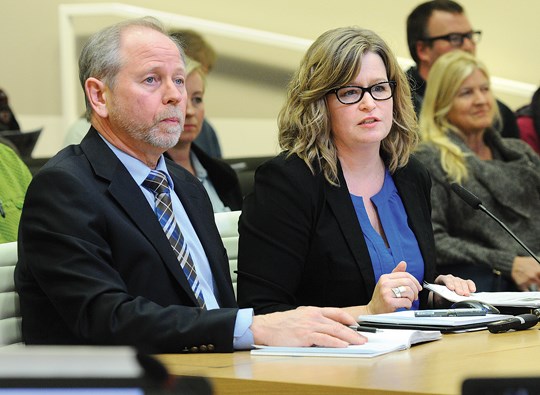It’s been a three-and-half-year gestation period but the birthing process for the City of North Vancouver’s new official community plan is nearing an end.
Following a three-hour public hearing Tuesday night, council voted 4-3 to send the plan for final approval.
The CityShaping process to design a high-level, long-term plan for the coming decades has been in the works since July 2011 but council voted the first version of it down in September last year.
The plan anticipates another 17,700 residents in the city by 2041, most of them along the Lonsdale corridor, Third Street and Marine Drive.
Single-family homeowners will be entitled to apply for both a coach house and secondary suite within the main house, as long as the total floor space doesn’t exceed what’s already permitted for single-family lots.
Gone are the “special study areas” for the Lucas Centre and Cloverley, which the school district requested be left with their status quo designations while it figures out what to do with the schools no longer needed for North Vancouver public school students.
A new special study area, however, has been included for the northwest corner of 13th and Lonsdale, which is owned by Hollyburn Properties, which is planning to build a mixed-use rental building on the site.
The 1500-block of Eastern Avenue and 200-block of East 15th will both be designated for towers of up to 12 storeys.
The biggest change between this draft and the one that went down in flames last September is a compromise that has apparently made peace between two warring factions in Moodyville.
A disproportionate amount of the OCP debate has been taken up by what to do with the neighbourhood in the wake of massive port expansion, the Low Level Road and a new bank of grain silos from Richardson International.
Residents below Third Street had lobbied for medium-density condos, which could be oriented away from the port property, while residents on Fourth Street pushed council to limit density to duplexes with suites so as to not spoil the neighbourhood. Under the plan headed for final approval, density has been scaled back along Third.
Residents from both sides of Third came out to speak in favour of the OCP, both factions saying while it wasn’t their first choice, it was a compromise they could live with, though Fourth Street residents stressed that council must use strict design guidelines that respect the single-family nature of the street.
By the time the document came up for a vote at just before 10 p.m. Tuesday, it had roughly 4,600 participants shape it through more than 100 community meetings.
“I would love to make you all happy but unfortunately we know that’s not always possible,” said Mayor Darrell Mussatto before casting his vote in favour. “I think what staff have crafted and what council is looking at here is something that helps lead us to the future of the City of North Vancouver — one that’s very enjoyable to live in, to work and to recreate.”
Big thanks are owed to the citizens who put in the untold thousands of hours in creating the plan that, ultimately, was a “good balance,” Coun. Craig Keating said.
“I’m very grateful that people care so much about their community, that they are so willing to continue to be engaged in this over such a long period of time,” he said.
Coun. Linda Buchanan said she supported the land use plan but she was particularly impressed with the way the OCP addressed public health and climate change through urban planning.
Even though they agreed there were some positive aspects in the OCP, Couns. Pam Bookham, Rod Clark and Don Bell voted against the plan. The most common grievances: the rate of growth and what it would mean for traffic and affordability in the city, as well as single lots with coach houses and suites.
“We are, I believe, developing too fast and by doing so are exacerbating problems we’ve been grappling with and not been able to find solutions too. We need time to address some of those issues in a more thoughtful way,” Bookham said.
On the Moodyville debacle, Clark said he couldn’t see how increasing density would make the neighbourhood more livable.
“Is increasing the density going to solve the problem? No, it’s going to make it worse. So, if I’m not able to walk around in the community tomorrow, well, that’s the price of politics,” he said.
The plan must still pass fourth and final reading, which will likely happen in late March or early April, according to staff. Rather than giving developers the green light to start building what’s in the plan, any new project would still have to go through the typical rezoning process.



